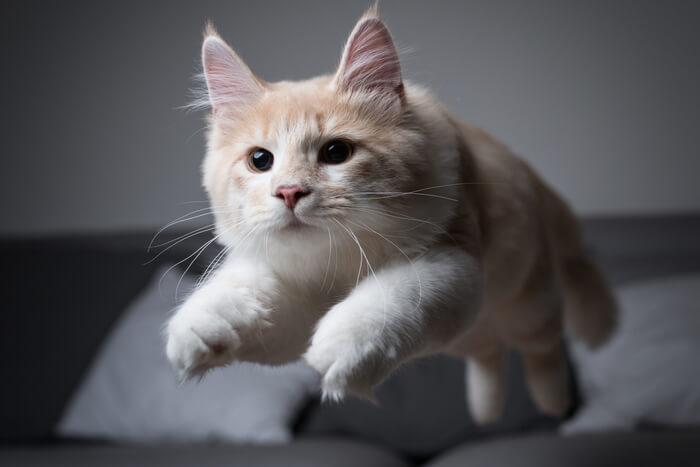 Whether you call them cat zoomies or cat crazies, this feline behavior is unmistakable.
Whether you call them cat zoomies or cat crazies, this feline behavior is unmistakable.
“Zoomies” is a word used to describe seemingly random periods of bursts of energy in cats. Cats with the zoomies might suddenly leap up and race around the living room or even the entire house, running, jumping, climbing and otherwise going crazy with activity.
Some cats punctuate their roomies with growling, yowling or meowing. Cat zoomies often seem to come out of nowhere and disappear after a while.
What Are Cat Zoomies?
Cats are known for strange behaviors, but cats are not the only species that exhibit zoomies. Dogs get the zoomies, too.
Believe it or not, there is even a technical term that veterinarians use for the zoomies: frenetic random activity periods (also known as FRAPs). Watching a cat with the zoomies can be pretty entertaining, but what exactly are they doing? And why do the zoomies seem to start up for no reason?
Why Do Cats Get Zoomies?
As it turns out, the zoomies are not random. There are several different reasons cats get the zoomies; some are related to cat behavior and some reasons are medical.
Let’s break down the most common causes of the cat zoomies:
Sleep-Related Zoomies
It’s no secret that cats sleep a lot. In between the long periods of rest and sleep, cats often experience a surge in energy (in the wild, this is when they would be hunting). That burst of feel-good vibes can sometimes trigger the zoomies in cats.
Hunting Instinct Zoomies
Despite having easy access to food, domesticated cats are still driven by their instincts to hunt and chase prey. Cats sometimes get the urge to act out on these instincts by stalking imaginary prey and suddenly pouncing, which may trigger the further urge to begin racing around the house in a frenzy of activity.
Boredom/Lack of Activity
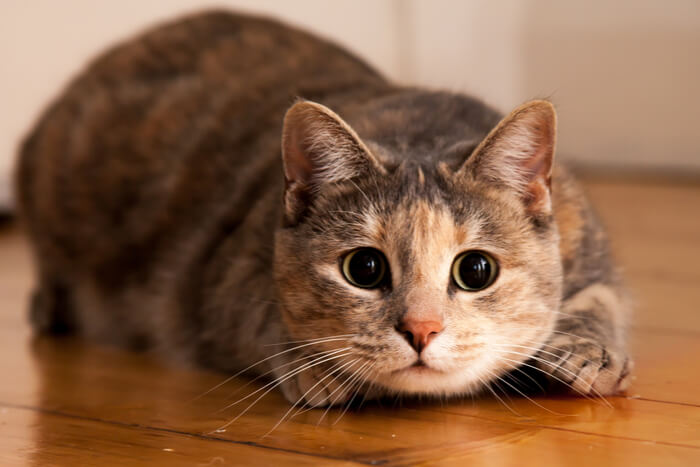
Some cats get a crazy look in the eye signaling an episode of the zoomies is about to commence.
Living inside is safe for a house cat, but it’s also far less interesting than surviving in the wild. Some indoor cats are desperate for something to break up the monotony, so they make up their own fun time in the form of the zoomies, which can combat their pent-up energy.
Feline Hyperthyroidism
Oddly enough, frenetic random activity periods (also known as FRAPs, or the zoomies) are one sign of hyperthyroidism in cats.
This condition, which is common in middle aged and senior cats, occurs when the thyroid gland becomes overactive, making too many thyroid hormones. In addition to hyperactivity, other signs of hyperthyroidism in cats include weight loss, increased appetite, increased thirst, excessive urination, vomiting and diarrhea.
If your cat is experiencing the zoomies more than usual, and is also displaying other symptoms of hyperthyroidism, have her checked out by your veterinarian.
Read More: Hyperthyroidism in Cats: Symptoms, Treatment, & Causes
Age-Related Zoomies
In senior cats, zoomies are sometimes a sign of dementia and cognitive decline related to conditions such as cognitive dysfunction syndrome (CDS).
Senior cats suffering from changes in sight, hearing, and their sense of smell may also start displaying frequent bouts of the zoomies—becoming startled by something can sometimes trigger the zoomies.
If your older cat starts showing more frequent zoomies, especially if she hasn’t really been prone to them before, have her checked out by a veterinarian.
Anxiety and Stress
When cats are feeling upset about something going on in their life, they may display behavioral changes, including an increased incidence of the zoomies. Sometimes, strife between one or more cats in a multi-cat household may lead to excessive zoomies. If you’re also noticing your cats having accidents outside the litter box, disharmony in the home may be to blame.
Bathroom-Related Zoomies
Some cats race around the house after using the litter box, especially after they poop. This can be a normal response, as sort of victory lap to the feeling of “lightening their load” so to speak.
However, if it happens often, or if it is combined with inappropriate urination or defecation outside the litter box, you should have your cat seen by a vet to rule out any health issues.
How To Stop Cat Zoomies?
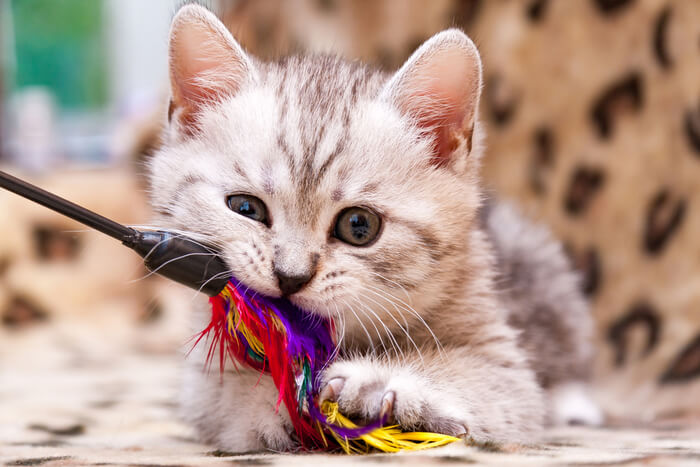
If you want to put the breaks on your cat’s zoomies, redirect her energy with play.
In healthy cats, the zoomies can be normal and behaviorally-appropriate. Some cats just love a good romp and run about the house to burn off excess energy. After all, it’s all in good fun.
As long as you believe that your cat’s needs are being met (she has plenty of cat toys, places to scratch, things to climb, places to perch, and lots of play sessions and other interaction with you) and you don’t suspect that your cat is experiencing a health issue, stress or anxiety, you can just let the zoomies run their course.
Cat zoomies are generally short-lived so you can usually just wait it out and your cat will return to her normal self. Most cats don’t zoom much longer than five minutes or so.
If you’re worried about your cat hurting herself (if she’s leaping from a tall cat tree), or breaking something while she’s zooming, or if her zoomies are simply driving you crazy (especially if they occur in the middle of the night), you wonder how you can turn them off.
If you want to put a stop to the zoomies sooner rather than later, lean into them by playing with your cat. It might sound strange, but engaging your cat with playtime during an episode of the zoomies can help. Try enticing your cat to bat at a feather wand toy, chase after her favorite jingle ball or pounce on a toy mouse.
The one thing not to do when your cat has the zoomies?
Don’t make the mistake of trying to chase your cat, and don’t try to pick her up and cuddle. Cats with the zoomies are highly aroused. Chasing or trying to pet your cat during a zoomies episode can backfire as your cat might turn her energy toward you and attack your hands or feet.
Even if the zoomies seemed to have ended, wait a little bit before petting your cat. Cats often remain riled up for a little bit after having the zoomies. Give your cat 10 or 15 minutes to settle down before going in for a snuggle.
After all that activity, she will probably be ready for your lap!
Also Read: Why Does My Cat Follow Me Everywhere?

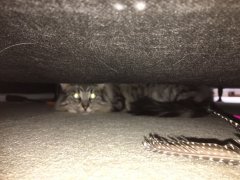

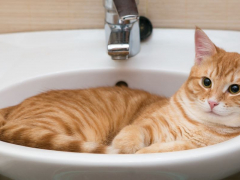
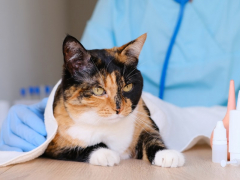


Last year I lost my 14 year old dog who was my constant companion and I was lost without her. I am 85 years old and live in a senior citizen building. My niece visited me from Myrtle beach and brought me a kitten. I have never had a cat and at times he can be very lovable snd other times he is knocking things over. I am having a hard time adjusting to this behavior and he gets the zoomies at night. I lock him out of my bedroom at night so I can get some sleep. I do love him but sometimes he tries my patience. I do miss my dog but at least I don’t have to go out in all kinds of weather to let my cat out. He is adorable though snd I am getting used to his behavior.
Hi Dolores, kittens can take a lot of attention and patience, but it does sound like you’re doing everything you can to adapt to this situation. I’m sure this phase will end soon, and you’ll have a calm feline companion at your side. Wishing you and your new kitty all the best. <3 - Mallory
Thank you for allowing me to share my feline experience.
Of course. It’s what we’re here for. 🙂
We are excited with our recently adopted kittens. They are two Tuxedo (black/white) males 4 weeks old. Based on past experience, my wife and I decided to get two cats that were bonded. We are looking forward to interact with both of them as a daily routine. We are both retired. As such, we can make it a priority to play with them. We had a beautiful 9 1/2 year old med hair tortoise multi colored tabby. Sadly she got a very aggressive cancer which took her too quickly. We love you SNOOKIE. These new kittens are not meant tp replace her, but to be able to say goodbye to her and start a new chapter in our lives. We just thank God for the time he allowed us to have her.
I’m sorry to hear that you lost Snookie so suddenly. Wishing you all the best with your two new kittens—they sound like a precious duo.
My cat Lily was adopted from my children for me she is my friend my child my baby everything so far she is 3 YO I only have one question in the day time she is sleeping by my side or in her chair on her blanket. According to what I red on your article everything is normal except one think at night when I lay under the covers she jumps and bites my feet (then I have to put her out and close the door I will appreciate any suggestion
Eve Sardi
Hi Eve, thank you for commenting! You know, I miss the days when my 13-year-old cat, Wessie, used to love attacking my feet underneath the blankets. It was annoying at the time, but that frisky behavior is something that I look back upon with fondness. I would recommend trying to tucker her out before nighttime by giving her some designated play before dinner. You can also distract her with toys to play with on her own. Between tiring her out and giving her something to play with instead of your feet, these two changes should help to keep her from doing this at night. – Mallory
Thanks for the information! And here we thought it was just Caramel acting crazy!
We experience the zoomies a lot around here. Usually, Cat A Chases Cat B through the house and then Cat B chases cat A in the other direction. This goes on for a good five minutes while Cat C watches.